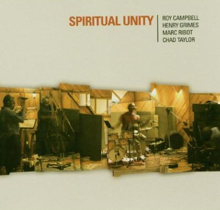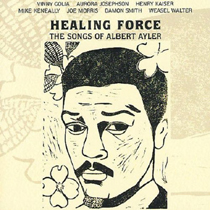Recent Tributes to Albert Ayler

|

|
by Mike Wood
(August 2011)
The harshest tone can also be the sweetest, if expressing an attempt to move beyond words to explain the passion of the moment. If it is expressing NOW. Free jazz, noise and other genres have clearly shown that while that music may be ear-splitting gibberish to some as well as unmusical and indulgent, but to others it is a spiritual path. All religions talk of a moment of advanced insight within which words are beside the point. Loud, free improvisational music obliterates thought and explanation; for some that opens the mind up for new ways to experience the world. Artists as disparate as John Coltrane, Merzbow, Derek Bailey and Neil Young have explored not only the catharsis of full-volume freeform expression, but also have not been afraid to acknowledge the spiritual benefit of that expression. Certainly Albert Ayler's entire career was built on accessing the holy spirit through pure, wordless sound. Despite his lack of commercial success in his career, musicians from every generation since have found inspiration in his fearlessness, his searching, his "barbaric yawp," as Walt Whitman would say.So, what becomes a tribute most? Imitation or expansion of ideas, a focus on the seeds of influence or on the fruits? To be or not to be reverent? These questions are most acute when that artist is Albert Ayler. What's the best way to pay tribute to him? Use his music as inspiration for one's own improvisational workouts? Or look beneath the chaos to find harmonies and compositional prowess hidden beneath the din?
For guitarist Marc Ribot, Alyler's music was (from his album's liner notes) a "ritual process, through improvisation, of experiencing and presenting the rawest moment of musical creation." Guitarists Joe Morris and Henry Kaiser have also recently channeled Ayler, also saying in their album's liner notes "through meditations, dreams, and visions, the players on this project were given the message to once again attempt to send the people of earth a message of love, peace, and spiritual understanding. We selected a representative set of tunes for this material and essentially let it play itself through us..."
Two recent tributes approached Ayler's work from varied angles. They both showed the limits of trying to catch Ayler's music in a bottle, even one labeled "ritual" and "visionary." Ribot's Spiritual Unity (the record) and Spiritual Unity (his occasional band) attempt to improvise their way through classic Ayler tracks, using his signposts for jumping off points into their own unknown waters. Morris, Kaiser, and the rest of the musicians who contributed to Healing Force - The Songs of Albert Ayler worked with Ayler's late, much maligned blues and pop records, and tried to draw out sounds and melodies that were initially lost in lame production, horrid singing and poorly-written attempts at being commercial. Both records are reverent and treat the music as still vital and on-going; neither fully reaches the level of passion and freedom of the originals, but that is to be expected. The question to be asked though, when comparing the two sets is what is added to Ayler's work and the study of it? Is Ribot's more traditional approach safer than the Morris, because it follows a similar style of the original? Does Healing Force redeem "bad" songs through better musicians or does it truly find hidden worth in long-dismissed songs?
2005's Spiritual Unity features one Ribot original and a handful of Ayler standards: "Spirits," "Truth is Marching In," "Saints" and "Bells," all from Ayler's mid-'60's peak. Ribot's tune, "Invocation, leads off the set by quoting Ayler motifs and announcing that his take is going to be aggressive and fully in Ayler's tonal ballpark. That he has bass legend Henry Grimes on board--who played on many an Ayler session--helps maintain that reverent feel.
(Note: For comparison, as I listened to Spiritual Unity, I also listened to some records from roughly the same time as the tunes chosen by Ribot for the set: Spirits, Nuits De La Fondation Maeght 1970, At Slug's Saloon (1966) and a Newport Jazz Festival bootleg from 6/30/67)
By contrast, one could make the case that Healing Force does not so much build off Ayler songs to explore the nuances as create new songs from the bones of the originals. The case/accusation for a little redemptive tweaking comes across most obviously in the vocals. On records such as New Grass and Music is the Healing Force of the Universe, Ayler's most explicit attempt at being current and bankable came in his use of vocals (and naive, "hip" lyrics). However, girlfriend Mary Maria too often sounds like 80-year-old Mae West trying to make it through a tune in Myra Breckenridge. It was bad enough to think of such a pioneer trying to sell a few records by appealing to "the kids," and especially people far beneath his level of true engagement with the times, but to put his name on such amateurish drivel was sad to behold.
So the good news is that Ayler did not understand trite shitty pop music at all. The bad news is that he tried to make it anyway, thinking it would sell. On Healing Force, having Aurora Josephson in place of Mary Maria is not so much tribute as a cosmic do-over; Josephson doesn't so much give the songs nuances that were obscured in the original tunes but creates new tunes. Like if Paul McCartney had dropped in during the Head sessions and sat in for Mickey Dolenz on vocals, comparisons are unfair, and problematic. Though no one can save the lyrics, Josephson illustrates the weakness of Maria more glaringly than the rest of the band illustrates the hidden melodies buried under the syrup of the original production. Curiously, they avoid 1971's The Last Album, which in some ways hints at a certain (non-embarrassing) peace with pop, and also is notable for an passionate guest appearance by Canned Heat guitarist Henry Vestine.
It is impossible to replicate the emotional expression of an artist; any tribute, in many ways, is beside the point, and more about the artists' revisiting the work than the originator of it, unless the music is used as a springboard for one's won exploration. Is the point when faced with a tribute to Albert Ayler, then, whether the record was too safe or not is translating his completely free spiritual and musical visions? Should it be Ayler's freedom or that of the musicians' using his music as inspiration that makes such a tribute successful?
While there is the reasonable question as to whether, consciously or not, the band responsible for Healing Force "improved" some of Ayler's worst music through their own professionalism, to my ears, it is more risky than Spiritual Unity. Ribot and company do not take many chances, neither extending Ayler's ideas or shining new light on them. Though passionate, the five songs on the record sound like Ayler, but really don't give a good reason why they were recorded. One can certainly argue that they needed no such reason to play music they love, but there was also an opportunity here that I think was missed. An Ayler tribute calls out for daring, holy stabbings at the sky.
Kaiser, Morris and company infuse new blood into and open new avenues for exploring late-period Ayler, a period that did not so much show decline as a sort of surrender to the deaf ears of most of the public. If their aim was to take an opportunity to shed light on previously maligned music, then Healing Force was a success, and one, I think, worthy of the man. The tunes on that set do not try to make embarrassing music palatable; without irony or a fan's willingness to suspend disbelief over their favorite's missteps, the assembled band looks at some obscure, weak songs, and therein finds some interesting things worth exploring.
Both Spiritual Unity and Healing Force are in their own ways reverent tributes to Albert Ayler. Neither adds or subtracts to the legend. But each album approaches his work from such radically divergent paths that the debate over the efforts of each ought to be one taken with fun, reverence and passion, both for the tributes themselves and for the work of the great man.